Bureaucratic
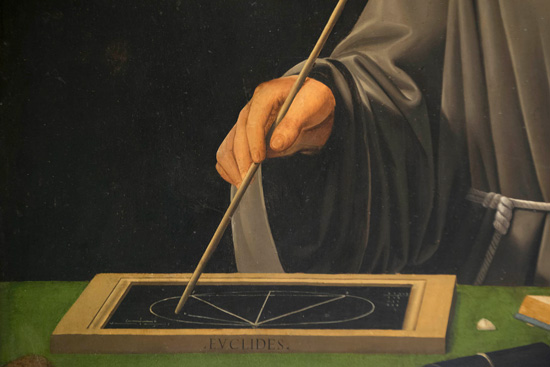
—form of enquiry—
– Portrait of Luca Pacioli, detail,
Jacopo de' Barbari
A good administration is not in itself an object of knowledge, but a form of enquiry.
This has two implications, or more accurately a mirrored pair of implications.
First, when we believe ourselves to be handling an object of knowledge, we are in truth usually handling its administrative apparatus.
And second, by extension, it is through our administrative structures that we come to know the various objects of knowledge which we believe to be the motive powers in our lives, rather than by their occasional direct impact.
It is also a remarkable fact (rather than a necessary truth) that, in the complex planar space of your life, should you take one step in any direction away from administration you will arrive, not at the object you seek to understand, but either at a bureaucracy, or at a structurelessness.
The virtues of Norbiton: Ideal City are almost impossibly precarious.
![]()
When I quit my job it was my intention to strip back the bureaucracy of my life to a minimum. This would be achieved in part by dumping some core elements—job, love life, plans for the future, and so on; and in part by the application of a simple sink-or-swim definition of priority: either something was sufficiently important and would get done, or was not sufficiently important and would be neglected.
Important how, or to what, I did not specify.
Most things were neglected.
With the passage of time, however, and the emergence of the Ideal City, I find that I now take pleasure in settling down once a month or so and looking into my paltry affairs. If my wish is to prolong my happy state, I reason, then a little light-touch intervention is not to be feared. And if that light-touch intervention (as instance my own light-touch intervention in Solomon’s shop) affords some mental space, some tidiness of mind, then it is to be not only not feared but welcomed.
![]()
Hunter Sidney is, by his own admission, a fine administrator. There is no shame in that. Just because it is a skill that he picked up accidentally, he reasons, does not mean that is a mere accident of his existence. It is part of what he is.
He is quick to add, however, that he is no bureaucrat. Bureaucracy is the reification of administrative practice. According to Max Weber it is characterised among other things by its professional status: the bureaucrat devotes himself to his Office as to a profession or a vocation.
Because he did not love his occupation, never intended to make a career of it, Hunter Sidney was content to administer what needed administering in his office world and leave it at that. But he was, he claims, repeatedly surprised to find that once he had completed his daily administration there was little or nothing substantial remaining to be done; so he doodled, drank tea, looked out of the window, and wandered the corridors until it was time to go home.
This managerial approach, to all appearances light-touch and thoughtful, resulted in some quickfire promotions1, but eventually compromised his hopes for further advancement at Shell (the bureaucratic leviathan in the belly of which, it turns out, he used to work) as it started to emerge over time that he didn’t really do very much.
The stagnation of his career, however, corresponded to a growing animation elsewhere.
![]()
In the right hands—Florentine hands, for example, or Hunter Sidney’s—the proper administration of affairs is an ethical activity. It is a simple discharging of duty, a respect for the object that is administered.
The Florentine Renaissance was built on broad-based administrative skills. Both literacy and numeracy were widespread. Every small tradesman or artisan could read and write and sum up his comings and goings. Great building projects were administered by rotating committees of appointed guildsmen. Merchants, bankers, craftsmen would sit on the committees and oversee the procurement of materials, the employment of labour, the commission of work, frequently details of the designs themselves. This created necessary tension with the Brunelleschi of the world; the architects. But in general good things got done through the concerted and unspecialised marshalling of civic resource.
It was not an administration of bureaucrats. You get the impression, perhaps erroneous, perhaps apt, that Florentine administration was an outdoor business—something you did standing up with a notebook in your hand in the cantina, or the warehouse—in the same way that the master mason who oversaw the building of a cathedral in the middle ages would also, you intuit, be hefting stones around. No office space, no bureaucracy. No one looking out of windows and dreaming of escape.
![]()
Hunter Sidney does not write much himself anymore, but is an administrator—perhaps even an originator, but he is too modest to say so—of the anti-literature.
What this means in practice is that he monitors the progress of various story-lines, the fate of various characters; he puts writers of different elements in touch with one another; he creates stubs and plot summaries; he copy-edits where necessary; he has, in other words, administrator privileges in his particular stratum of the deep net.
His contention is that what he now does is not substantially different to what he previously did, as a writer. Or, more precisely, his contention is that writers are administrators: they do not penetrate but adumbrate their objects of knowledge.
To that end, they (writers) have tools (stylistic, conceptual, generic) for handling and distributing various resources (affects, plot devices, characterisations) which they deploy more or less efficiently in pursuit of a given (if necessarily imprecise) cost-benefit ratio (expressed as a work of art).
A novel, in other words, or a philosophical essay, or any sort of discursive writing—perhaps any writing at all—is an account rendered. Of something. But as with any technique for handling data, it is a moot point how far this process of data retrieval or generation discovers for a given public (stockholders, IRS, readers) the object of its attention—the something—and how far extracting that something in fact creates it.
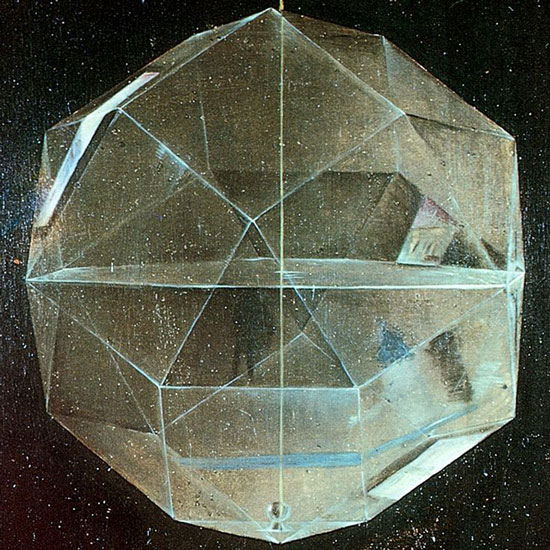
—extracting that 'something'—
– Glass Rhombicubooctahedron,
– Jacopo de' Barbari
![]()
In 1494 Luca Pacioli, Platonising mathematician, Franciscan, roommate and intimate of Leonardo da Vinci, published in Venice as part of his summa de arithmetica 2 the first relatively complete codification of double-entry bookkeeping.
This codification was based on centuries of ad hoc practice which saw accounting move from a personal narrative mnemonic aid (on the first Sunday after Whitsuntide a pig to Mr Rossi) to a form of public accounting for the benefit of partners, stockholders, ultimately the state and tax officials. Double-entry provided a standardised, tabulated ongoing record of capital in and capital out, handling all credits and debits in the form of a single Rational Idea—money.
In the process, it has been argued (by for example, Max Weber), double-entry bookkeeping brought into being a new compound object, Capital, which could be examined, handled, used, extruded, morphed, and so on.
That may be so. But it is for present purposes irrelevant whether the process created capital or a second-order object—the standardised balance sheet, say—which could be considered, discussed, manipulated almost without reference to the furore of individual actions and transactions lying behind it.
What is relevant is that an intellectual or epistemological disposition, a way of seeing, is not passive but active. This is obvious, or if not exactly obvious, then well-known3.
It follows, I think, that the more refined our perceptual tool, the more exact, the more substantial, and, not paradoxically, the more fragile (because more complex) the object we bring into being. The handling (and ongoing creation) of these second-order objects is, according to this account, how we administer our life.
It could also be argued that what Pacioli achieved was not in fact a codification of a practice but an opportunistic appropriation of a series of manuscripts (as the word summa suggests). It was the printing press, therefore, with its capacity for brute-force iteration, and not Pacioli's huge S-type brain, which was the instrument of decoherence.
The manuscripts in question would have included the numerous text books circulated for use in the scuole d’abaco – schools of commercial arithmetic set up to teach prospective bankers' clerks and tradesmen their basic mathematics. One well known example of these books was Piero della Francesca’s trattato d’abaco. Piero does not write about accountancy practice specifically (although many of his example are of the if-Peter-has-three-oranges variety, and are clearly directed at the accurate disposal of accounting problems), but it seems poetically consonant (which is to say, very possibly irrelevant but worth mentioning) that it was Piero who, in the confluence of his de prospectiva pingendi and many of his extant works, graphically laid out the mathematical underpinnings of that other great rational object of intellectual administration of the quattrocento: Linear Perspective.
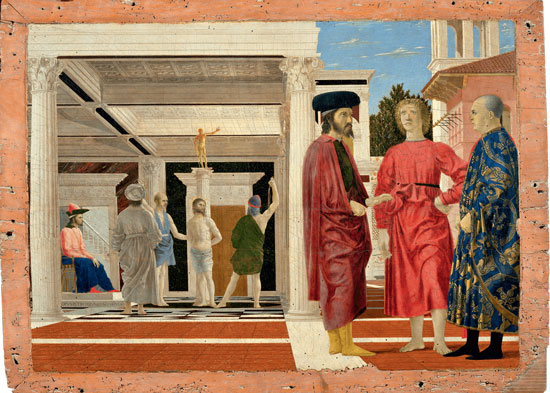
—Intellectual Administration—
– Flagellation,
Piero della Franscesca
![]()
As with double-entry bookkeeping, so too Linear Perspective does not discover so much as create an object of knowledge—in the case of the former, Capital, in the case of the latter, Infinity.
What starts as the straightforward administration of pictorial space—how do we place sculpturally modelled objects in coherent relation to one another on a flat plane?—develops into the discovery and exploration of a different sort of conceptual space, so that in the course of a little more than two centuries of artistic and scientific meditation on, among other things, optics and infinity, we move from this:
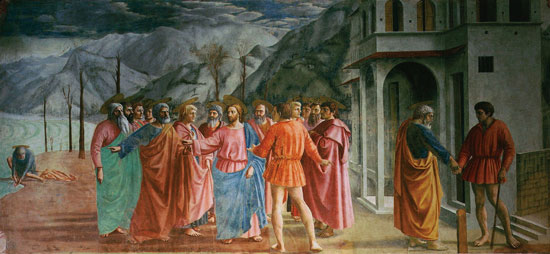
—virtuous, monolithic—
– Tribute Money,
Masaccio
(where Peter appears three times, first, in narrative sequence, in the centre grouping, pointing with Christ; then taking the coin from the fish's mouth, left; then handing the money to the lickspittle, right) to this:
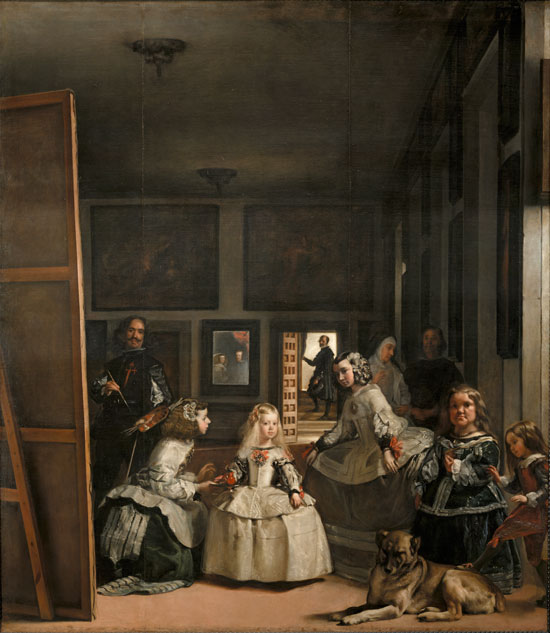
—vicious, fascinating—
– Las Meninas,
Diego Velázquez
(where the subject of the painting is us, but we are a dim reflection of the King of Spain and his featureless wife).
I am not sure which is stranger.
I am no doubt making too vast a point here. How would I sum it up? That the objects of knowledge which Linear Perspective wishes to nail down neither start being strange nor stop being strange; both Masaccio's (virtuous, monolithic) committee of apostles and Velazquez's (vicious, fascinating) court bureaucracy swim in an aquarium of oddness that purports to be nothing other than a straight-dealing account rendered of weights-and-measures space.
However, Masaccio, you might say, is haunted by oddities that derive their contours from the repeated retelling of the nested parables and accounts of miracles in the New Testament; Velazquez is on the leading edge of oddities that will derive from a Newtonian account of optics as the interaction of particles. Masaccio deploys his figures in space and across narrative time with a conceptual eye to the balance of volumes both on the picture plane and within the visual pyramid (like a mason considering the next course of stones, weighing balance and mass against schedules of delivery and seasonal employment patterns). Velazquez places his planes and mirrors and intersecting glances with, I repeat, bureaucratic intrigue.
![]()
Hunter Sidney’s great work of anti-literature (great in the context of anti-literature is purely a recognition of magnitude, not status in the canon: by definition, there is no canon) is called The Love Filter.
Part of his administrative work is to develop for The Love Filter a common policy or set of frameworks to which contributors are expected to conform. This allows him, he says, to guide the narrative, or rather to provide nodes or attractors around which the narrative may coalesce.
We are sitting in his top front room—he lives opposite me, a few doors down, and I can see him when he is at his desk if I crane forward from mine. Back in the days when I had a job I knew him as Mouse Man, because my own wireless mouse seemed to play up, seemed to become entangled with someone else’s, whenever this shadowy figure was at his desk. I knew this to be impossible—surely the range of interference was too great?—but it persisted as a superstition.
He tells me now—this is the first time I have been in his house—that he never owned a wireless mouse and yes, anyway it is impossible. We are drinking tea and looking at his screen in the substantial gloom of the unlit room at dusk; only the screen is illuminated, and the various LEDs associated with his computer, his small network, red and green, blinking and steady.
He is showing me The Love Filter, showing me how the bifurcations work, how you gain access to it, how it is shaped. He admits that he has a sort of practical shorthand map of it, but that it is all notes and half-pointers, nothing more that a accumulation of yellow stickies, really, illegible to anyone else.
He says that he can never be responsible for a map because he himself is scattered through the whole thing, like Orpheus. Were he to map it he would inevitably reconstitute that body. He speculates that the only way it could be mapped properly—objectively—would be to collect the paths that readers charted in their passage through it and present them as a statistical mass; this would show main lines, convergences, divergences; he says that in his imagination it would look like a Lorenz Attractor.
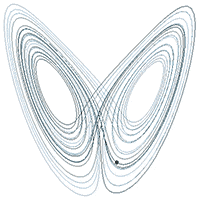
—collect the paths—
– A Trajectory Through Phase Space in a Lorenz Attractor
Image: Dan Quinn (Own work) [CC BY-SA 3.0 (http://creativecommons.org/licenses/by-sa/3.0)], via Wikimedia Commons
And then he says a curious thing. He says that The Love Filter has, for him, a known centre; in this ministry of a thousand rooms, there is a minister (what he actually says is that Orpheus's head is out there somewhere, still carolling away); and the whole fiction, if you can call it that, is organised around a convergence—deferred, derailed, obstructed, repeated—between two people. It is not, in other words, as strange and remote as it seems.
And then he says, in laconic elucidation of its formal properties, 'when I was younger I was married but I left my wife for another married woman, and then that all got locked down in misery too. Now I don’t see either of them. My life has been an immense and catastrophic blunder or set of blunders; but I am sure that they have been blunders towards something. Or more precisely, blunders around someone.'
He sums all this up by quietly admitting that ultimately he did not escape from the circle of bureaucracy; he became, in the end, not a bureaucrat of the oil business, or a bureaucrat of the literary object, but a bureaucrat of his own misery, and of the structures that necessarily grew up to administer it.
'But', he concludes, turning on a light and standing up to make a cup of tea, 'at the end of it all I hope, if not to penetrate, then to have a last unmediated glimpse of what it pleases you to call, in your dry way, my 'object of knowledge', but which I invariably think of as her.'
![]()
In the administration of your personal affairs you are alone. And Hunter Sidney’s account of the singularity at the heart of The Love Filter seems to indicate that in his eyes at least even fine and sensitive administration is a form of retreat, and that in consequence the writing of a book, or the progress of a love affair, or the construction of a city—all extended forms of enquiry—are no more at base than the narration of a defeat, a protracted negotiation of terms, a capitulation to your own bureaucratic soul.
You could, however, make an argument—perhaps should make an argument—that some unmediated residue always remains.
So to take an example: while those men of taste and business, Francesco di Francesco Della Luna and Goro Dati, both of whom sat repeatedly on the works committee of the ospedale degli innocenti during the many years of its construction, and not just Della Luna and Dati but also Brunellesco himself, might look on the fruit of their administration or of their administered desire, and see figured in it a history of their own struggle, their own blundering or felicitous intervention; and perhaps to a degree, as we do, see dimly or clearly figured in it the precursor and emblem of the stile nuovo of the Renaissance of the arts in Florence and Italy, a thing of beauty and formal harmony.
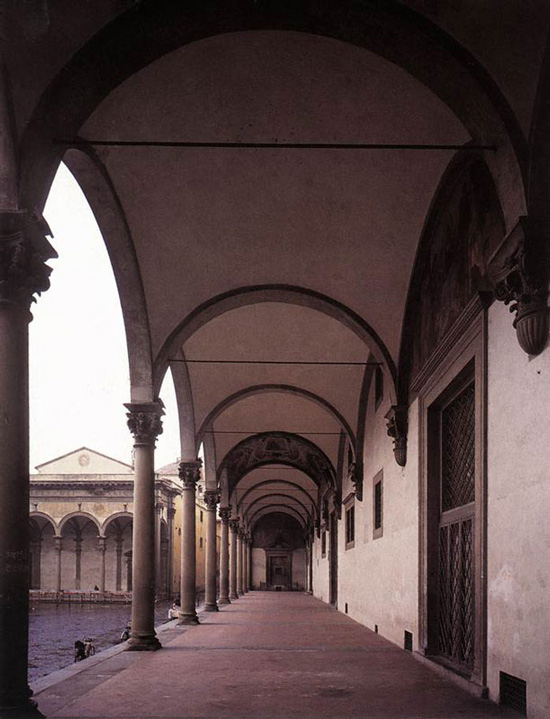
—formal harmony—
– Ospedale degli Innocenti,
Brunelleschi
Others—women, mothers—creeping up to it in the dark, at night, hurriedly, in secret, would not see it all, would not see an architectural marvel or a charitable institution or even a foundling hospital, would not, in that anxious moment, have an Idea of it at all; but would recognise the shape or the shadows of the corner of the place where they could in extremity leave their child and where, walking away, through whatever turbulence of feeling or unfeeling there might be, would somehow know or perceive or understand or feel or hope that the child would be looked after, or ministered to; and might somewhere beyond that intuit that that same child would one morning many years hence walk, happy and anonymous, down those steps, across the sunlit Piazza Santissima Annunciata, and out into the world on his or her own nimble feet.
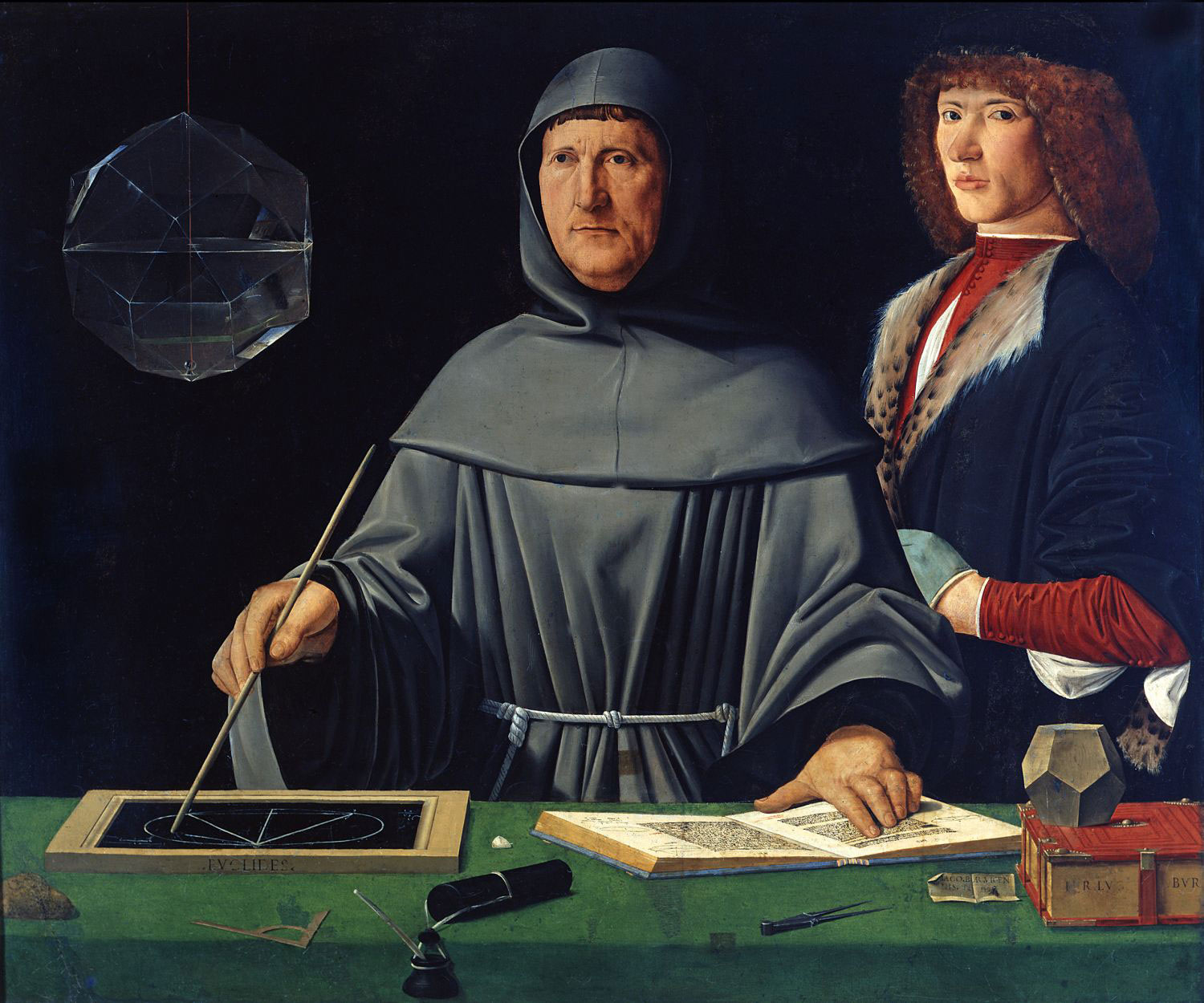
—nimble feet—
– Portrait of Luca Pacioli,
Jacopo de' Barbari
